

The Dubai Museum is the city’s main museum. It is located inside the Al Fahidi Fort, built in 1787 and to date the oldest building in Dubai. The museum opened to the public in 1971, the year of the independence of the United Arab Emirates, by an idea of the Sheikh of Dubai, in order to show traditional life in the area.
The museum is increasingly becoming a tourist destination in the city: in 2007, it welcomed around 600,000 visitors, while in 2013 there were more than one million.
Inside the Dubai Museum one can see the fort and the various exhibits. From the fort, one enters the galleries, where one can admire some glimpses of the area’s traditional culture, especially from the 19th century, such as local antiquities and handicrafts from Asian and African countries with which Dubai had trade relations.
There are also some models, small-scale settings that recreate scenes of daily life in the emirate before the discovery of oil.

Al Fahidi Fort was built in several stages: the oldest tower dates back to 1787 and is the oldest building in Dubai still standing today. Originally built to protect the surrounding territory from incursions by tribes living in the area, over the years it was then used as a sheikh’s palace and even as a prison, until 1969, when Sheikh Hamdan Bin Rashid Al Maktoum sent a letter to Sheikh Badr Mohammad Al Sabah of Kuwait, requesting that a museum expert be sent to Dubai to help turn the fort into a museum.
The Al Fahidi fort has a square shape, three of its corners are occupied by towers. Next to the walls stands a dhow, a traditional boat of the area, right in the middle of a large courtyard covering the underground galleries. Two cannons stand guarding the main gate, adorned with the flags of Dubai and the United Arab Emirates.
In the middle of the courtyard is an arish, a typical summer house, built exclusively of palm fronds. Inside, it includes sleeping and sleeping areas, as well as a fully equipped kitchen and objects used by inhabitants in past centuries. The house has a typical wind tower shape, used as a natural conditioning mechanism before electricity.
The entrance to the tunnels is located at the tower at the south-west corner of the fort. There are old maps of Dubai and some interactive videos showing the evolution of the city from before the discovery of oil in the 1960s to the present day.
Other scenes painted and reproduced in models show artisans, vendors and buyers going about their daily lives in the bustling souks of Dubai in the last century, while others show what life was like in the desert: a date factory, a camel, some wild animals and a Bedouin tent filled with jewellery and utensils belonging to the daily life of Bedouins.
The Dubai Museum is located in the Bur Dubai area, in what is the original hub of the city, a short walk from the Bastakiya district and the Grand Mosque.
The area is served by the red metro (Bur Juman stop, but you have to walk more than a kilometre from the exit) or the green metro (Al Fahidi stop, but the green line is notoriously more inconvenient to take for tourists living in Jumeirah or along Sheikh Zayed Road).
A very nice way to reach the Dubai Museum is by crossing the Creek on board an Abra, the typical boats used by locals in past centuries: from the Abra station in Dubai Old Souq it is only a few minutes away.
City Card allow you to save on public transport and / or on the entrances to the main tourist attractions.
